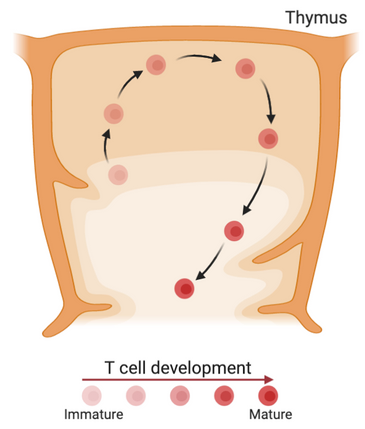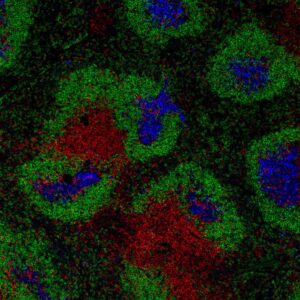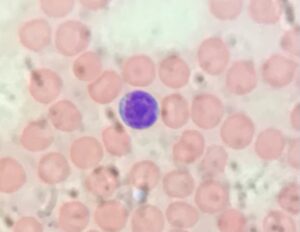Guess what, today I’m going to talk about the coolest organ of them all, one that does not get as much attention as it deserves (some bias was added to this sentence). This organ ensures the development of our immune cells which are specialized in fighting infection and cancer. Yes, we will be talking about the Thymus!
Since this post will feature some of my favourite things in life (Thymus, T cells) I decided to add the “cherry on top” and talk about a research paper that studied the effects of spaceflight on the thymus. Because if you know a little about me, you know that I am obsessed with space. So why not combine everything? More than ever… get ready to be amazed!!
Thymus: where T cells are made
What is the most amazing organ of them all? One might say “the brain!”, “the heart”… well, wait until you meet the thymus. This is an organ located just on top of our heart and it has a very organized structure. This organization is crucial for the proper development of our T cells, which you will understand why in just a minute.
T cells are part of our adaptive immune system, and it is believed that we have around 2×10^12 (= 2,000,000,000,000) T cells in our body [1]. The key question is: are all of those T cells the same? And the answer is, no.
We have many, many, different T cells in our body. Why? Because each T cell will be specific to a small fragment of a microorganism that could cause disease (called pathogens). Therefore, we must generate T cells that are specific to all the possible pathogens we encounter during our lifetime.
If that sounds like an impossible task, you are not alone with that thought. However, inside the thymus, many different mechanisms work together to generate this MASSIVE amount of different T cells, and most of the time, it works perfectly!
But how?
Cells that are able to give rise to T cells enter the thymus through blood vessels. These cells are quite immature, meaning that they haven’t yet decided whether they will become a T cell or not…(exactly, “To T or not to T?” kinda situation)*. Specific signals within the thymus will provide the appropriate cues that will tell our immature cells: “Yes, you should follow this route and become a T cell”. Once that signal is sent, our cells will migrate within the highly organized structure of the thymus as they develop.

Cell migration during T cell development within the highly organized structure of the thymus. Created with BioRender.
In each stage, T cells will receive cues that will allow them to continue the maturation process. During development, a single immature cell that enters the thymus can undergo up to 20 serial divisions, which means that a single cell can proliferate enough to give rise to one MILLION cells! [2]
This process, however, must be tightly regulated to ensure that our thymus will only generate “good T cells”. Therefore, during each important developmental stage, our immune system will pretty much ask: “Is this a good or a bad T cell?” Only the good ones will continue the maturation process, and the bad ones will be deleted.
So, in the thymus, we can observe a lot of cell proliferation but also a lot of cell death, so we keep only those T cells that will provide us with protection. After all this process, functional T cells will be released from the thymus to populate our body and help us fight infection and cancer.
Alright, this is cool, but is there more? And in science, the answer to this question is always yes!
During stressful times…
The fuzz as to why I love the thymus does not stop here. This organ actually shrinks A LOT during specific stressful situations, this phenomenon is called Thymic involution or Thymic atrophy. But don’t worry, most of the time, the thymus will return to its original size as soon as the stress “is removed”.These “stressful situations” can occur during pregnancy, malnutrition, infections, cancer and others [3].
You might now be asking yourself how can the thymus keep its highly organized structure during such events? And the answer is: it can’t. Unfortunately, the thymic structure gets “messed up” during this process and the consequences of such a phenomenon are yet to be fully uncovered.
Since the thymus organization is so important for the proper development of our T cells, thymic involution can have very detrimental effects. Imagine for example that this shrinking prevented the thymus from pumping good T cell, would that make you less capable of fighting infections or cancer? Or what if this shrinking prevented the thymus from discriminating between good and bad cells, would that have detrimental consequences?
Although many hypotheses as to why thymic involution happens, have been proposed, we are still lacking a complete understanding of this phenomenon. Nevertheless, it is important to note that each “stressful” situation is different from one another, and therefore, the reason as to why this process happens must be studied individually.
Even with so many questions still to be answered, thymic involution seems to be conserved among most vertebrates that possess a thymus (with the exception of some shark species) [4,5]. Therefore, evolutionarily speaking, this process has been around for a long time.
For all the aspiring astronauts
At this point, the next logical question would be, does the thymus also change… during a spaceflight? What happens to the thymus of astronauts (and cosmonauts) that are living in the International Space Station (ISS)?
You bet I was extremely excited when someone asked this exact question. Scientists did experiments to analyze the thymus size and structure of animals onboard the ISS [6]. And GUESS WHAT… thymic involution occurred! Although the researchers did not observe an overall change in the thymic structure, its organization was not exactly the same as the control sample. Their data suggest that spaceflight (more specifically, the effect of microgravity) might lead to a decrease in cell proliferation, which could explain why the thymus was smaller in space.
These are a few reasons why the thymus is so important, and how different situations can change its structure and/or function. Thanks for stopping by for one more of my ImmunoThoughts!
Keep asking questions, and seeking answers!
From your immunologist – in training,
Stefanie Valbon
*New data has started to question this scenario, as it is now believed that immature cells might be already committed to becoming a T cell once they enter the thymus. So, keep this possibility in mind! [7]
References
[1] Alberts, B. et al. Molecular Biology of the Cell Fourth Edition (2002).
[2] Porritt, H.E. et al. Heterogeneity among DN1 prothymocytes reveals multiple progenitors with different capacities to generate T cell and non-T cell lineages. Immunity 20, 735-745 (2004).
[3] Ansari, A.R. & Liu, H. Acute Thymic Involution and Mechanisms for Recovery. Arch Immunol Ther Exp (Warsz) 65, 401-420 (2017).
[4] Shanley, D.P., Aw, D., Manley, N.R. & Palmer, D.B. An evolutionary perspective on the mechanisms of immunosenescence. Trends Immunol 30, 374-381 (2009).
[5] Zakharova, L.A. Evolution of adaptive immunity. Izv Akad Nauk Ser Biol, 143-154 (2009).
[6] Horie K. et al. Impact of space flight on the murine thymus and mitigation by exposure to artificial gravity during spaceflight. Scientific Reports 9, 19866 (2019).
[7] Chen, E.L.Y., Thompson, P.K. & Zuniga-Pflucker, J.C. RBPJ-dependent Notch signaling initiates the T cell program in a subset of thymus-seeding progenitors. Nat Immunol 20, 1456-1468 (2019).



